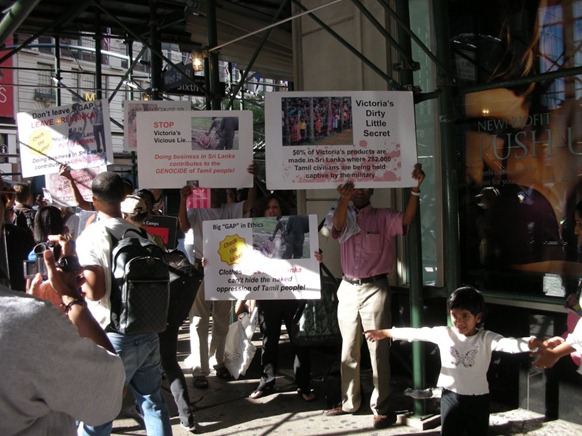Sixteen US cities and six UK cities held boycott Sri Lanka rally Saturday between 10 a.m. and 4:00 p.m. local time campaigning against buying clothing made in Sri Lanka. The rally gained momentum in California as students from Stanford University joined the rally in front of the Gap and Victoria’s Secret stores, to signify beginning of a student movement across the US, said one of the organizers. "As long as the opression of the Tamil people and the occupation of their land continue, we will carry on with our anti-apartheid style campaign against the 21st century apartheid regime in Sri Lanka," one of the Stanford students attending the rally said.

A media release issued by the US Tamil Political Action Committee (USTPAC) that organized the rally said:
"The protesters held signs depicting the genocidal situation in Sri Lanka and calling to check the lagel and not to buy if it were made in Sri Lanka. The Vice President of USTPAC, Dr Ellyn Shander, leading the protest in New York city stated, "It is imperative that consumers across the world fight genocide and war crimes by boycotting companies doing business in countries with immoral human rights record and blood stained policies of genocide.
"The activists passed out flyers making the consumers aware of their unintended contribution to an oppressive regime. "We are asking Victoria’s Secret, GAP, and other garment companies to get out of Sri Lanka and stop the genocide of Tamil people," said Dr Shander, adding, "We the consumer can make a difference. We walk in the shoes of those who broke apartheid in South Africa with the boycott of that oppressive government."
PHOTO: Click here to view Stanford photo album
Stanford University students join boycott rally
On August 15th, the European Union suspended the GSP+ trading concenssion to Sri Lanka after giving a 6-month time frame on February 15th to rectify EU’s concerns of Sri Lanka’s human rights record and setting specific demands to satisfy EU’s requirements. The suspensi follows an investigation by the European Commission that said the country fell short in implementing three UN human rights conventions relevant for benefits under the scheme.
The estimated losses of earnings from apparal export is expected to reach $500 million, according to local reports. Sri Lanka presented a bold face amidst the suspension announcement with its Central Bank declaring that "on a net basis the total value of the losses is only about $102m and that the Sri Lanka Government has strengthened its macro economic fundamentals to face any eventualities and has taken measures to deal with the loss."
In July, the British clothing retailer, NEXT, stopped sourcing its garments from Sri Lanka because of the uncertainty of the continuance of the GSP+ duty concession from the European Union. The company has moved production to Bangladesh, an industry source told the paper.
Meanwhile, exports to the EU fell 13% in the first quarter of 2010, a decline the Sri Lankan garment industry attributes to falling demand due to the economic conditions there.
Garments are Sri Lanka’s largest foreign exchange earner.
(For updates you can share with your friends, follow TNN on Facebook and Twitter )
